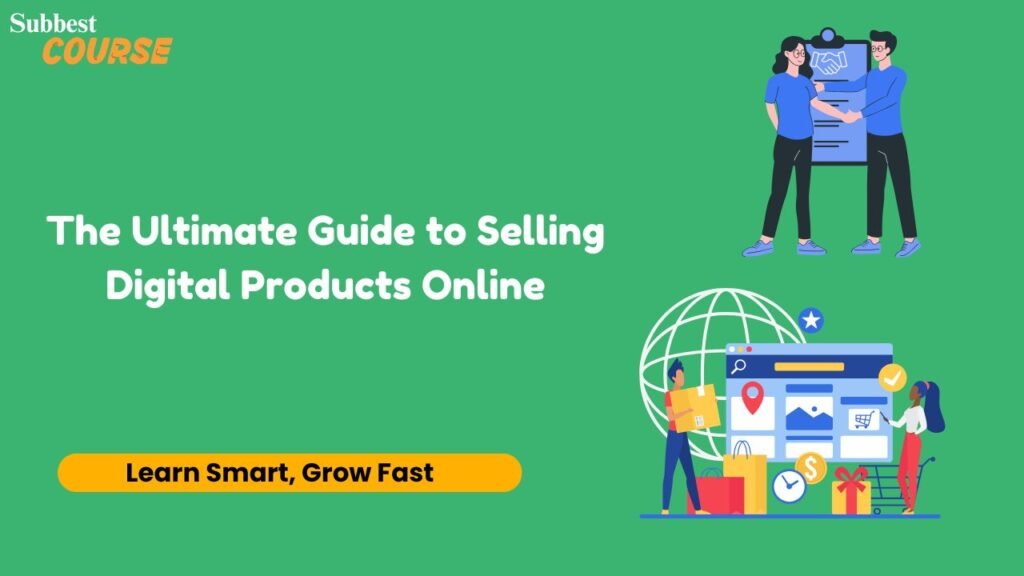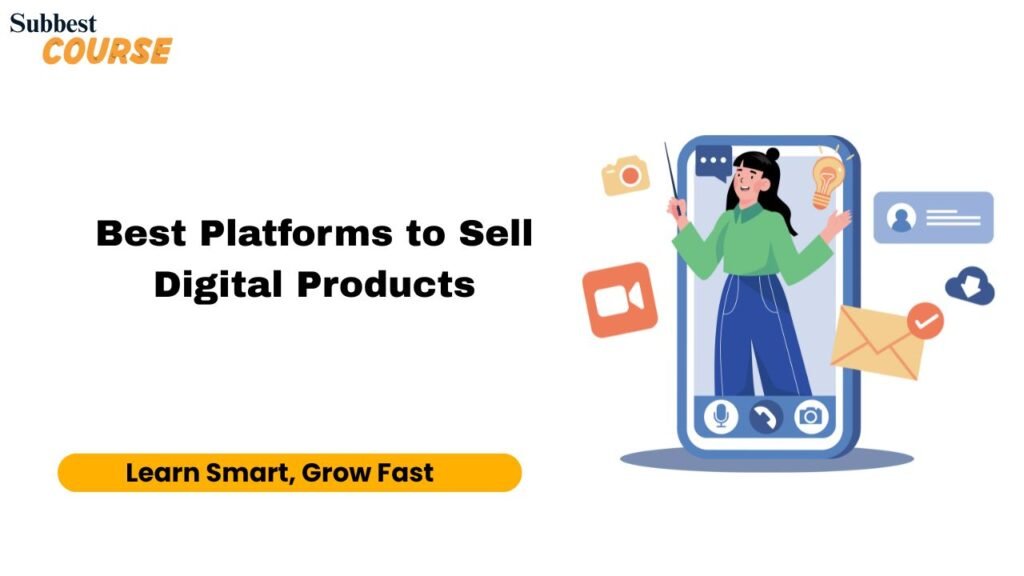
The digital economy has revolutionized the way people buy and sell products. In today’s world, selling digital products is one of the most scalable and profitable ways to generate passive income. Whether you’re a content creator, designer, educator, or entrepreneur, the opportunity to sell digital products online offers a wealth of possibilities.
This guide will take you through everything you need to know about selling digital products—from what they are to how to create, market, and scale your digital business.
What Are Digital Products?
Digital products are intangible assets that exist in digital form. Unlike physical products, they can be created once and sold repeatedly without the need for inventory or shipping. Some common types of digital products include:
1. E-books & Guides
- Self-help books, how-to guides, educational books, etc.
- Examples: Kindle books, PDF guides, recipe books
2. Online Courses & Educational Content
- Video lessons, tutorials, webinars, and skill-based courses
- Examples: Udemy, Teachable, Skillshare courses
3. Stock Photos & Graphics
- High-quality photography, vector illustrations, design elements
- Examples: Shutterstock, Adobe Stock, Canva templates
4. Software, Apps & Plugins
- SaaS products, mobile applications, website plugins, automation tools
- Examples: Shopify apps, WordPress plugins, mobile games
5. Printables & Templates
- Planners, resumes, business cards, worksheets, calendars
- Examples: Etsy printables, Canva templates
6. Music & Audio Files
- Royalty-free music, sound effects, meditation tracks
- Examples: AudioJungle, Pond5, SoundCloud beats
7. Membership Sites & Subscriptions
- Exclusive content, premium newsletters, mastermind groups
- Examples: Patreon, Substack, private Discord communities
Benefits of Selling Digital Products
High-Profit Margins
- No manufacturing or shipping costs
- Once created, products can be sold indefinitely
Passive Income Potential
- Automation allows for continuous revenue
- Scalability without additional production costs
Low Initial Investment
- No inventory or storage needed
- Most platforms allow free or low-cost entry
Global Reach
- Sell to customers worldwide
- No geographical barriers
Minimal Maintenance
- Unlike physical products, digital products require little upkeep
- Instant delivery via downloads or online access
How to Start Selling Digital Products
Step 1: Choose Your Niche
Identify a profitable niche based on your expertise, skills, and market demand. Popular niches include:
- Business & Entrepreneurship
- Health & Wellness
- Personal Development
- Finance & Investing
- Tech & Software
Step 2: Create a High-Quality Product
- Use the right tools (e.g., Canva for design, Teachable for courses, Scrivener for e-books)
- Ensure value and uniqueness
- Keep the user experience in mind
Step 3: Choose a Selling Platform
There are several platforms to sell your digital products:
- Your Website (via WordPress, Shopify, WooCommerce)
- Marketplaces (Gumroad, Etsy, Creative Market, Udemy)
- Membership Platforms (Patreon, Kajabi, Podia)
Step 4: Set the Right Price
- Research competitors and market trends
- Offer tiered pricing or bundles
- Use strategic pricing like “$19.99” instead of “$20”
Step 5: Market Your Digital Products
- SEO Optimization (Google ranking, keywords, blog posts)
- Social Media Marketing (Instagram, Pinterest, Twitter, LinkedIn)
- Email Marketing (Lead magnets, newsletters, exclusive deals)
- Affiliate Marketing (Partnering with influencers or bloggers)
- Paid Ads (Facebook Ads, Google Ads, YouTube Ads)
Step 6: Automate & Scale Your Business
- Use email funnels (ConvertKit, MailChimp, ActiveCampaign)
- Implement customer support automation (chatbots, FAQs, help centers)
- Expand with upsells and cross-sells

Gumroad
- Easy-to-use for creators and solopreneurs
- No monthly fees, pay-per-sale model
Etsy (for Printables & Templates)
- Large customer base looking for digital downloads
- Ideal for planners, invitations, and artwork
Shopify (for Full E-commerce Store)
- Best for those who want full control
- Great for scaling businesses
Teachable & Udemy (for Online Courses)
- Ideal for selling educational content
- Built-in student management and certification
Amazon Kindle Direct Publishing (for E-books)
- Best for authors and writers
- Access to a global audience
Common Challenges & How to Overcome Them
Competition
- Find a unique angle or niche
- Invest in branding and storytelling
Customer Trust
- Provide testimonials and reviews
- Offer money-back guarantees
Piracy & Unauthorized Distribution
- Use PDF encryption, watermarks, license keys
- Sell through trusted platforms with digital rights protection
Driving Traffic & Sales
- Invest in content marketing and SEO
- Use influencer collaborations
- Offer free resources to attract leads
Case Studies: Real Success Stories
now continue more information
Alex’s $100K Side Hustle with E-books
- Alex started selling niche e-books on Kindle and Gumroad
- Built an audience via YouTube and Instagram
- Now earns six figures annually with automated sales
Jane’s Etsy Printables Business
- Created digital planners and journals
- Leveraged Pinterest for organic traffic
- Now making $5,000/month from passive sales
Mike’s Online Course Empire
- Launched a $99 video course on Skillshare and Teachable
- Used Facebook ads and a lead magnet strategy
- Scaled to $20,000/month revenue in one year
Conclusion
Selling digital products is one of the most lucrative online business models available today. With minimal costs, high scalability, and unlimited earning potential, anyone can start and succeed in the digital marketplace.
By identifying your niche, creating high-quality products, marketing effectively, and automating processes, you can build a sustainable digital product business that generates long-term income.
Ready to start? Choose your first product idea and take action today!